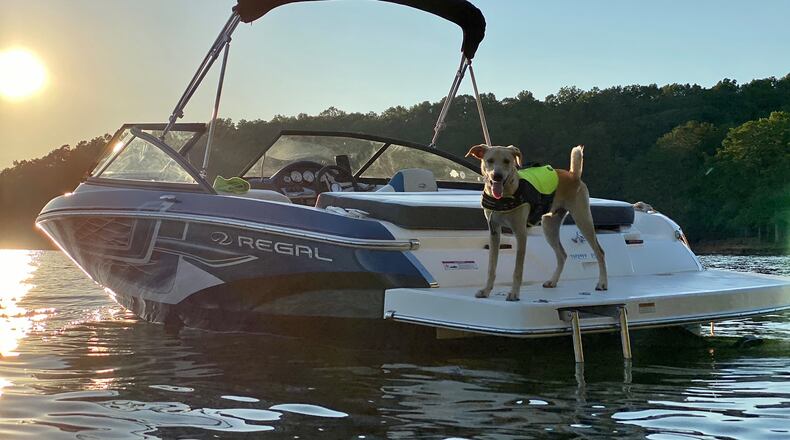Davis Adams always was a city type of guy. But, like a lot of others, Adams and his partner, Baron Smith, found that the pandemic hit them upside the head and they started viewing their life differently.
“If you had told me three years ago I would be living in a log cabin on Lake Lanier, I would have said ‘definitely not. No, no, no.’ But now I’d be lying if I said that when I come into the city that the traffic and driving over potholes don’t stress me out. We wanted to live in a place that subtracts from our stress, not adds to it, and where we live now removes the stress every time.”
Traditionally a lake house was for retirees or a weekend getaway for people with money. Today a lake house is becoming the primary residence as people found they could work anywhere and didn’t need to wait for their dream home.
Credit: Courtesy of Davis Adams
Credit: Courtesy of Davis Adams
Prices and Demand Rising
Nationally, lake property prices are skyrocketing and demand is at an all-time high. Prices in upstate New York’s Finger Lakes shot up 18.33% in 2020 and in the last eight months of 2020, there was an increase of 167% of buyers looking specifically for lakefront homes, according to Finger Lake Premier Properties. Chicagoans are moving and lakefront home sales in Walworth County, just over the Wisconsin state line, rose 53% in July and August 2020 compared with 2019, according to Metro MLS data. The average price-per-square-foot rose 38% to $556, according to an article in the Chicago Tribune.
It’s happening in Atlanta as well. Take Lake Oconee, for instance. Sales of lakefront homes in gated communities increased almost 72% from 64 in 2019 to 110 in 2020; sales for lakefront homes outside the gates rose 62% from 130 in 2019 to 210 in 2020. The average sales price for a home inside a gated community rose almost 10% for $1.4 million to $1.5 million; average sales outside a gated community increased by almost 7% from $552,929 to $599,974, according to Lake Oconee Realty.
Credit: Handout
Credit: Handout
“It’s been a very hot market for the last year and a half,” says Lisa Steele, an agent with Lake Homes Realty, who focuses on Lake Arrowhead near Waleska in Cherokee County. “The buyers are younger than in the past. I typically sell 55-plus retirement homes or homes for eventual retirement, now it’s dipped into the late 30s, early 40s. As a result, there’s a lot more traffic on the lake. We’re seeing a lot more kayaking, paddle boarding. We’re dubbing it a ‘fitness lake’.”
In addition, homeowners who rented their houses out are now living in them. “I’d say now about 15% are on VRBO; it used to be a much higher number. The pandemic changed that. It’s a big switch over the last 18 months.”
Prices are also going up. Today, a fixer-upper on Lake Arrowhead would cost at least $500,000; five years ago, it would be about $350,000. “It’s a big difference. And now prices are knocking on the door around $2 million.”
Judy Presley with Keller Williams Realty Lake Partners, says that today’s buyers are offering significantly above asking price, with many cash buyers. “People are pulling money out of places they wouldn’t necessarily have before but they feel like they need that as a bargaining chip,” she says.
Kim Yarrington, an associate broker with the same firm, says that COVID-19 “brought a lot of this on. COVID forced people to work in their homes and they decided to work in a place they really wanted to be. Atlanta isn’t that far. We just sold a lake home to a man from Miami who was originally looking for a weekend home. He decided to make it his year-round residence. We’re also seeing younger buyers.”
In 2019, 384 Lake Lanier properties were sold; in 2020, that number was 670. In seven months of 2021, 520 homes were sold. Prices are going up as well. Presley recently had a house appraised at $675,000, which went on the market for $825,000 and closed at $850,000, Presley says.
Credit: Handout
Credit: Handout
Adding to the “buy now” mentality is that COVID-19 has impacted construction costs and availability of materials, making the option of buying land and building less desirable. “Some builders aren’t taking any new orders until 2022. People are opting to move in right now,” she says.
Glenn S. Phillips, CEO of Lake Homes Realty, the nation’s largest lake-focused real estate company, says several factors are driving this buying trend. “When COVID hit, people looked around and said I can work anywhere, why not just find a house on a lake that pleases us and live there. It’s a ‘life is too short’ mentality,” he says. “Younger people are selling their intown homes at a great price and getting a lake house to work remotely. Some of them will go to the office two to three days and stay in a hotel, as a trade-off for living on the lake. We’re finding that people are choosing the lake that best suits their lifestyle needs rather than choosing a house.”
Segueing off the ‘life is short’ mantra are others “who contemplated an eventual lake home but who are doing it now so that they can enjoy the grandchildren at a place where everyone wants to be at and enjoy,” he says.
A third subset of the COVID-19 buying segment are “people who just wanted to move out of the more restricted states, and many of them are in the more expensive states to live in. They are getting their dream lake house in places with lower taxes,” Phillips says. “You’re seeing a lot of people in California and the northern states moving to Georgia, Alabama, the Carolinas, Texas, and getting lake houses where they can enjoy all the recreational activities and be in nature — at a lower cost.”
Credit: Jamie Bogner, courtesy of Shanon Evans
Credit: Jamie Bogner, courtesy of Shanon Evans
Shanon and Bryan Evans planned to retire to a lake property but it was a few years off. Still, one day they looked at lake properties on a lark and fell in love with a house. They decided to sell their Acworth country club home and purchase the Lake Arrowhead property as their full time residence. Trouble was someone offered $100,000 over the list price in cash with no contingencies, and they lost the house. Undeterred, they purchased a lot to build their home as well as a townhome to live in while construction was underway. Shortly thereafter her two sisters and their families visited and bought lots to build their own homes. Lots were going for around $350,000 when Evans bought hers, but recently someone sold a lot for $600,000, she says.
“My mother lives on Lake Oconee and my sister on Lake Lanier but they fell in love with the lake and will live and retire here,” say Evans. “About a year earlier we were standing around the table thinking it would be neat to find a lake and land where everyone could live there forever and be with grandkids. We couldn’t have planned it. But I have to admit that in the back of my head, COVID made us antsy and we were ready to find our paradise now.”
COVID-19 in the city or lake?
Davis Adams and Baron Smith each had a condo in Atlanta but realized it made more sense to share one condo and buy a house on Lake Lanier to rent out and use for weekends. They found a cabin in Hall County, closed on it Jan. 23, 2020, and renovated it so it would be a “great Airbnb. Three weeks later, the borders closed and suddenly we were there.”
Credit: Courtesy of Davis Adams
Credit: Courtesy of Davis Adams
Adams contracted COVID-19 in March and was “really sick, incredibly sick. I was turned away from the hospital because old people needed the beds. They didn’t want me and told me I would survive. I went back to the cabin. The whole world — including me — was panicking. I didn’t want to go back to Atlanta and the condo where 200 people would be sharing elevators. We wanted to control our environment.”
The pair moved to the cabin to wait out COVID-19 and found their stress levels were down. Both had employers who “prioritized people’s comfort” and allowed them to work from home. “We had no issues working from the cabin. Our Wi-Fi has been good and the only thing missing is the community of co-workers.”
Adams admits the lake lifestyle, while a relaxing one, took some adjustment. “I miss the multicultural aspect that Atlanta brings, and I mean ideas, people, culture, food. Baron misses a great martini and an occasional $100 Italian dinner.”
They are settled into a more structured routine, partly as a result of a lack of nearby options. They are cooking more and logistics are thoroughly planned. “We have a recipe plan in advance and we map out what we’re going to eat for a week because we can’t easily go to the store. We actually bought a Weber grill; we used to have a George Foreman. It’s a healthier lifestyle but you are aware that the amenities you took for granted are no longer around you.”
Credit: Courtesy of Davis Adams
Credit: Courtesy of Davis Adams
Their social life has evolved as well. Instead of spending money and going out to restaurants, after work they now Jet Ski. “It’s free. People pay for that on a vacation,” he says. Although Adams says his Atlanta friends visit often, he’s found a new social set. “We meet people on the water. You’re in a cove and find yourself talking to the people on the next boat and sharing drinks. It’s a different community.”
Evans admits the rural life has some disadvantages. “We almost had to fight to get cable and, of course, we are putting a generator into our house. If there’s ice here, you’re stuck.”
But she’ll take the trade-offs. “We call it our slice of heaven. You come into the gates and you see bald eagles, deer with babies; the wildlife engulfs you. We pinch ourselves because once you’re here, you’re in a whole different world.”
About the Author
Keep Reading
The Latest
Featured









